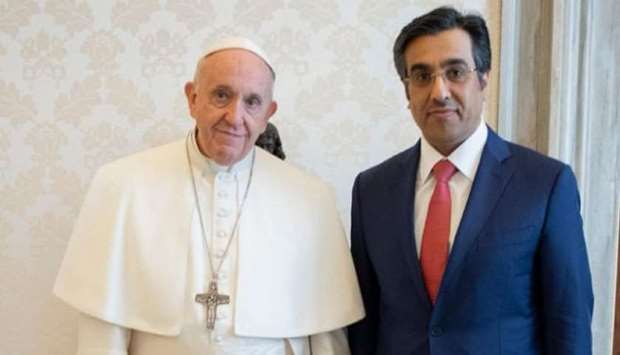HE the Chairman of the National Human Rights Committee, Dr Ali bin Smaikh al-Marri, has met Pope Francis and conveyed the complaints and sufferings of thousands of victims of the unjust blockade imposed on Qatar by the Saudi-led quartet.
Saudi Arabia, Bahrain, the UAE and Egypt imposed a siege against Qatar on June 5, 2017.
During his meeting with the Pope, which took place on Thursday at the Vatican, HE al-Marri called on His Holiness to take an urgent humanitarian stand by pressing those countries to stop their grave violations and to end the suffering faced by the victims, including students expelled from their schools as a result of the unjust blockade against Qatar for almost 20 months.
Al-Marri urged Pope Francis, ahead of his visit to Abu Dhabi, to pressure the UAE authorities and the other countries of the blockade and demand that civilians be kept out of the political crisis, and to hold those countries accountable for the grave humanitarian consequences of the crisis in order to protect human rights and defend peace and security.
At the same time, he warned that the persistence of the UAE in its violations will threaten peace and security in the region.
During the meeting, al-Marri gave a brief summary of the repercussions of the blockade imposed on Qatar.
He warned against the escalation of human rights violations due to the stubbornness of the blockading countries and their refusal to respond to the complaints and appeals of those affected, as well as their neglect of reports by the Office of the High Commissioner for Human Rights and the decision of the International Court of Justice.
The chairman of the NHRC expressed his appreciation of the efforts made by Pope Francis to protect human rights in the world, stressing the committee's readiness to strengthen partnership and co-operation with the Vatican to support its efforts to protect human rights in the region and the world.
Al-Marri told Pope Francis that he carries a message from thousands of families that have been torn up for 20 months as a result of punitive measures that lack morals and human values.
He added that the measures adopted by Saudi Arabia, the United Arab Emirates, and Bahrain also caused couples to get separated from their children under the pretense of a political dispute with which those families have no connection.
He added that Qatar is supportive of the efforts of the Pope in establishing peace and security around the world, but noted that the victims of the blockade wonder what future of peace is there in the GCC in light of the hate and the discrimination demonstrated by the United Arab Emirates, Saudi Arabia, Bahrain and with support of Egypt against the people of the Gulf.
He criticised the rhetoric of the blockading countries that call for peace, while blockading and violating the rights of people at the same time.
He highlighted that even the people of the blockading countries did not escape those punitive measures, as they were prevented from being with their families and relatives in Qatar.
HE al-Marri pointed out that the call for peace should be preceded by the call to lift the blockade imposed on Qatar and lift the injustice on its victims.
He stressed that there is no real will on the part of the UAE to bring peace to the region, as it works to punish the people through the actions taken against citizens and residents of the expulsion of students and the violation of the right to property, work, movement and residence, as well as the involvement of UAE officials in incitement in the media and various platforms.
He also noted that the UAE and Saudi Arabia previously approved a law that criminalises the sympathy of their citizens with the people of Qatar, threatening them with imprisonment and huge fines.
On the occasion, HE al-Marri presented the Pope with a book of manuscripts on human rights in Islamic culture.
During his meeting with the Pope, which took place on Thursday at the Vatican, HE al-Marri called on His Holiness to take an urgent humanitarian stand by pressing those countries to stop their grave violations and to end the suffering faced by the victims, including students expelled from their schools as a result of the unjust blockade against Qatar for almost 20 months.
Al-Marri urged Pope Francis, ahead of his visit to Abu Dhabi, to pressure the UAE authorities and the other countries of the blockade and demand that civilians be kept out of the political crisis, and to hold those countries accountable for the grave humanitarian consequences of the crisis in order to protect human rights and defend peace and security.
At the same time, he warned that the persistence of the UAE in its violations will threaten peace and security in the region.
During the meeting, al-Marri gave a brief summary of the repercussions of the blockade imposed on Qatar.
He warned against the escalation of human rights violations due to the stubbornness of the blockading countries and their refusal to respond to the complaints and appeals of those affected, as well as their neglect of reports by the Office of the High Commissioner for Human Rights and the decision of the International Court of Justice.
The chairman of the NHRC expressed his appreciation of the efforts made by Pope Francis to protect human rights in the world, stressing the committee's readiness to strengthen partnership and co-operation with the Vatican to support its efforts to protect human rights in the region and the world.
Al-Marri told Pope Francis that he carries a message from thousands of families that have been torn up for 20 months as a result of punitive measures that lack morals and human values.
He added that the measures adopted by Saudi Arabia, the United Arab Emirates, and Bahrain also caused couples to get separated from their children under the pretense of a political dispute with which those families have no connection.
He added that Qatar is supportive of the efforts of the Pope in establishing peace and security around the world, but noted that the victims of the blockade wonder what future of peace is there in the GCC in light of the hate and the discrimination demonstrated by the United Arab Emirates, Saudi Arabia, Bahrain and with support of Egypt against the people of the Gulf.
He criticised the rhetoric of the blockading countries that call for peace, while blockading and violating the rights of people at the same time.
He highlighted that even the people of the blockading countries did not escape those punitive measures, as they were prevented from being with their families and relatives in Qatar.
HE al-Marri pointed out that the call for peace should be preceded by the call to lift the blockade imposed on Qatar and lift the injustice on its victims.
He stressed that there is no real will on the part of the UAE to bring peace to the region, as it works to punish the people through the actions taken against citizens and residents of the expulsion of students and the violation of the right to property, work, movement and residence, as well as the involvement of UAE officials in incitement in the media and various platforms.
He also noted that the UAE and Saudi Arabia previously approved a law that criminalises the sympathy of their citizens with the people of Qatar, threatening them with imprisonment and huge fines.
On the occasion, HE al-Marri presented the Pope with a book of manuscripts on human rights in Islamic culture.



